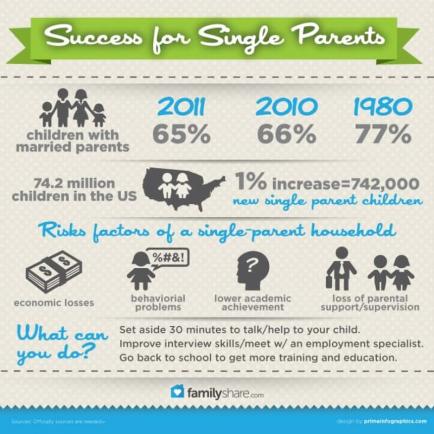
According to the 2012 annual report by the Federal Agency Forum on Child and Family Statistics, 65 percent of children in 2011 live with two married parents compared to 66 percent the previous year. In 1980, 77 percent of children lived with two married parents, a 12 percent change.
Why should we care? Consider that there were 74.2 million children in the United States in 2010. A 1 percent change potentially accounts for 742,000 children being born into homes with a single mother or father. The general trend is that more children by percentage are entering single-parent homes, approximately 30 percent in 2011.
Whether single parenting is a choice or circumstance, single parent homes can pose a significant risk factor for children. While many of us may come from or may know successful, happy, well-adjusted people who come from a single-parent home, single-parent homes are correlated with a number of challenges that make life harder.
Some of the negative impacts of growing up in a single parent home include the following:
Economic loss
Perhaps one of the most significant factors is the loss of income that a two-parent home provides.
Loss of parental support and supervision can lead to:
Increased behavioral problems
Children from single parent homes often spend more time alone and have less supervision. In the case of divorced or separated parents, they also must deal with two different housholds and often two different sets of rules and parenting styles. They can lose consistency in parenting.
Lower academic achievement
When the job of two parents becomes the responsibility of just one, it is difficult to keep up with all the added responsibilities. It may be hard to maintain a level of interest and involvement in school work.
Protecting children from unnecessary risk
While the effect of growing up in a single parent home increases the risk of negative effects on children, it is not a forgone conclusion. Not all parents will marry. Single parents can have a positive impact on their children. Single parents can raise successful, competent children by protecting and loving them.
Increase income
One way to improve the chances for a child's success in a single parent household is to have a stable, steady income. If a family's temporal needs are met, they'll be able to focus on their emotional needs.
If you're a single parent, try some of these tips to see if you can increase your earning power:
-
Brush up your interview and resume writing skills, then try meeting with an employment specialist in your community. They may be able to teach you these skills or help you connect with employers.
-
Increasing your level of education might give your children the stability and income that will make a difference in their life. Don't rule it out; school might be the perfect way to show your children a great example of dedication and love.
-
Check all options. Look into grants and loans to help finance your education. Try to choose an occupation that will provide you the most money and the most time with your children.
Encourage positive behavior
Behavior may be more difficult to address, especially if the child is older. There are a vast number of behavioral deficits that can affect children of single parent households. Here are some ideas to keep behavior in check:
-
Remain consistent in your expectations.
-
Be aware of your children's activities.
-
Get to know their friends.
-
Know where and how they spend their time when you are not there.
-
Check in often. Make sure they know that eventhough you are busy, you have time for them and that you love them.
-
Don't hesitate to ask for help, speak with a professional physician, therapist or psychologist about the best course of action for addressing any behavioral challenges.
Stay involved
-
Make an appointment. You could try setting aside 30 minutes a day to talk to your child about homework or what they did in school that day.
-
When possible, vollunteer at your child's school.
-
Make every effort to attend their activities.
-
Make the most of the time you have together. Practice spelling words in the car. Use mealtime to talk. Read stories during bathtime.
-
Ask for help. If you feel like things are getting away from you, don't be afraid to enlist the help of a grandparent or trusted friend.
In the ideal world, every child would grow up in a two parent household. But that's not reality.
It's easy for society to focus on the negative impact single-parent housholds have on children. But you are not a statistic. It is important to focus on what you have to offer. You know your children better than anyone else. You love them. You want the best for them. You can work tirelessly to give them what they need.
Do you want them to go to college?
Do you want to nurture a particular talent?
Do you want them to know how much you love them?
Decide what your child-rearing priorities are and focus the time and energy you have on those things.
Being a single parent comes with great challenges, but it is possible to raise healthy, happy, successful children in a single-parent household. You can do this.

